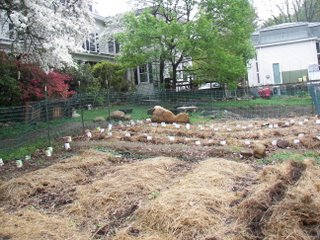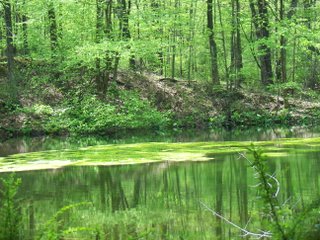Monday, May 22, 2006
Food For Thought
More and more people are looking for ways to reconnect with nature and the source of our daily nutrience. Check out what the sisters at the Community of the Holy Spirit and other Episcopal communities are doing to bring rogation days closer to our daily lives.
A prayer for Rogation Days:
O merciful Creator, your hand is open wide to satisfy the needs of every living creature: Make us always thankful for your loving providence; and grant that we, remembering the account that we must one day give, may be faithful stewards of your good gifts; through Jesus Christ our Lord, who with you and the Holy Spirit lives and reigns, one God, for ever and ever. Amen.
Friday, May 19, 2006
Hospitality
At the same time I’ve been learning a lot about religious orders and visiting a few in my area. One of the strongest characteristics of these religious orders is a vow of hospitality. They live in such open communion with each other and the divine that they must extend that communion to the world. This means extending hospitality to everyone who comes to them, as well as those they have never met. I have had the privilege of experiencing this hospitality. It is an amazing and powerful experience.
I think hospitality is also the mark of motherhood. A mother is quite literally a vessel of hospitality as the embryo makes its home in and takes its sustenance from her very body. Whether your motherhood is biological or adoptive, it is the opportunity to open oneself to the endless possibilities of feeding, sheltering, and caring for those in our care.
Hospitality isn’t an easy virtue to develop. It requires sacrifice, commitment, and the desire to encounter the “other”, as children truly are. You can’t plan or train or manage them into being clones. They represent their own individual persons that you are simply host to for a time.
I hope to develop a hospitality that will enable me to encounter any situation with an attitude of love. Here’s a quote from Carter Heyward about love and I think this love is necessary for the development of hospitality.
Love, like truth and beauty, is concrete. Love is not fundamentally a sweet
feeling; not, at heart, a matter of sentiment, attachment, or being "drawn
toward." Love is active, effective, a matter of making reciprocal and mutually
beneficial relation with one's friends and enemies.
Love creates righteousness, or justice, here on earth. To make love is to make justice. As advocates and activists for justice know, loving involves struggle, resistance, risk. People working today on behalf of women, blacks, lesbians and gay men, the aging, the poor in this country and elsewhere know that making justice is not a warm, fuzzy experience. I think also that sexual lovers and good friends know
that the most compelling relationships demand hard work, patience, and a
willingness to endure tensions and anxiety in creating mutually empowering
bonds.For this reason loving involves commitment. We are not automatic
lovers of self, others, world, or God. Love does not just happen. We are not
love machines, puppets on the strings of a deity called "love." Love is a choice
-- not simply, or necessarily, a rational choice, but rather a willingness to be
present to others without pretense or guile. Love is a conversion to humanity --
a willingness to participate with others in the healing of a broken world and
broken lives. Love is the choice to experience life as a member of the human
family, a partner in the dance of life, rather than as an alien in the world or
as a deity above the world, aloof and apart from human flesh.
Sunday, May 14, 2006
Seeds of Life
 We spent a wonderful day at Bluestone Farm in Brewster. The nuns practice organic gardening and sustainable living. In the evening, we had a thoughtful discussion on the topic of life, which touched on the beauty and potential of seeds, the beginning of the universe and the work of the Divine. Following the discussion we had a lively drum session. The drum circle was intense and energizing. In the morning we attended morning prayer with the sisters in their small chapel. After breakfast one of the sisters took us on a tour of their huge gardens.
We spent a wonderful day at Bluestone Farm in Brewster. The nuns practice organic gardening and sustainable living. In the evening, we had a thoughtful discussion on the topic of life, which touched on the beauty and potential of seeds, the beginning of the universe and the work of the Divine. Following the discussion we had a lively drum session. The drum circle was intense and energizing. In the morning we attended morning prayer with the sisters in their small chapel. After breakfast one of the sisters took us on a tour of their huge gardens. It was such a peaceful experience. The sisters are very aware of the changes in the seasons, since their daily schedule of prayers and work centers around the sunrise/sunset cycles of the year. Their religious life is practiced in light of the beauty and majesty of creation and the interconnectedness of all beings.
It was such a peaceful experience. The sisters are very aware of the changes in the seasons, since their daily schedule of prayers and work centers around the sunrise/sunset cycles of the year. Their religious life is practiced in light of the beauty and majesty of creation and the interconnectedness of all beings.I was delighted to experience the peace and

beauty there along side the litergy and devotion of the convent. I was challenged to find a way to connect more to the divine in every situation and everyone.
Friday, May 05, 2006
Women of Prayer
During the retreat I had a long conversation with a new friend about prayer and faith. She was reluctant to believe in prayer, since she felt it was impossible to PROVE that prayer works. She also said that too often she sees people who don't have any evidence of faith in their lives suddenly turn to God when something terrible happens. She doesn't think this is a true faith or at least not one she wants to embrace. She said she only prays when there's some trouble in her life and that feels dishonest to her.
I often pray when I am upset or overwhelmed and when I am thankful or happy about something. But those are both extremes of emotion. What I have trouble with is praying consistently. Praying as a mode of existence. My spiritual director is gently urging me to explore prayer as listening to God not just reacting to an experience in my life.
It's so difficult. I don't have time. I don't have patience. I don't know what to do. I enjoy thinking about prayer, but it rarely translates into time spent praying.
In light of that, I found an interesting site on Women of Prayer and Justice.
The first women I read about was Hildegard of Bingen:
In Scivias, which took her ten years to complete, Hildegard records a series of visions describing the relationship between God, humanity, and the cosmos. Hildegard's visions reveal her views on the human person and the relationship between God and humans in creation. She had visions also about the incarnation and redemption, and the church. Central to her spirituality is her belief that human nature is good as is all of creation. She saw sin as a distortion of that goodness.
Hildegard's teachings give us an original and balanced view of the universe. She tells us that our own nature--the rhythms of our minds and bodies--are an echo of the greater rhythms of the natural world such as the rhythm of ocean waves beating against rocks on the shore. In her symbolic illuminations or mandalas which accompany her text, she shows all creation, including humans, emanating from God's love.
Throughout her life Hildegard was fascinated with beauty and light. She loved to reflect on the life principle of energy shining forth in living things. She originated the word “viriditas” or “greenness” to speak of this principle of vitality in all of nature. She lived all of her life surrounded by lush green scenery and flowing rivers. These experiences contributed to her love of the color green and her frequent use of this color to describe the good life.
Hildegard saw greening power at work in so many ways, especially in the actions of the Holy Spirit moving over the earth causing all things to flourish. What is dry and barren and lifeless can be restored by the return of greening power and moisture. Greenness brings freshness and life to what is stale and lifeless.

This photo shows the “greenness” of the ancient grounds of the Disibodenberg monastery where Hildegard spent the early years of her religious life. In the foreground we see the remains of the main entrance into the abbey church where she worshipped so faithfully.
What do you see when you look at this picture? How do you find "greenness" in your life? How can you be part of returning "greenness" to your family, your community or your world?
Pray with all creation Hildegard's Antiphon for the Holy Spirit:
The Holy Spirit is a life that gives life,
Moving all things.
It is the root in every creature
And purifies all things,
Wiping away sins,
Anointing wounds.
It is radiant life, worthy of praise,
Awakening and enlivening
All things.
Hildegard of Bingen: Mystical Writings, ed. Fiona Bowie and Oliver Davies (Crossroad, 1990), p. 118.